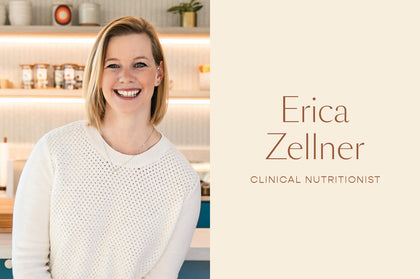I get it; making dietary changes can be really overwhelming sometimes. Where should you start? How much change is necessary? What should be your priority? As a clinical nutritionist, I work with people every day to answer these questions and support their optimal health! And when we’re considering our hair wellness, there’s no better place to start than in your kitchen. Here are my six top tips for promoting hair wellness with every meal — plus, find out what supplements you really should be using to help provide optimal nutrition for your hair.
1. Keep Protein Handy
Your hair is nearly 90% protein, but as a non-essential function, hair growth is not a priority for your body. That’s why if you’re interested in long, healthy and strong hair, protein needs to be a top priority in your diet.
Protein is made up of amino acids. And your body needs 20 different amino acids to function properly. Nine of these amino acids are essential — meaning we must consume them through our diet. This means that the key to protein intake is variety. Each protein source is made up of different amino acids in different amounts. I recommend keeping a variety of protein sources in your kitchen for optimal hair health.
Shop: Best-Selling Hair Products & Supplements
2. Include Healthy Fats Daily
Dietary fats are an essential part of a healthy diet. They provide energy, increase vitamin uptake and support cell function. For your hair, healthy fats like walnuts, avocado, extra-virgin olive oil and coconut oil nourish your hair follicles to give your hair strength and shine — and can even reduce hair loss!
Read: 12 Foods to Grow Your Healthiest Hair Ever
3. Eat Veggies and Fruits Regularly
Did you know that only 9% of American adults get the recommended amount of vegetables in their diet? This surprisingly low intake carries with it a lot of nutritional consequences. And yet, we know how important it is to have a variety of veggies and fruit in our diet for optimal health. Plants provide our body with vitamins, minerals, phytonutrients, polyphenols and phytochemicals, all of which play crucial roles in our health.
The next time you’re going grocery shopping, challenge yourself to get at least one plant from every color of the rainbow.
4. Hydrate Adequately
Drinking enough water is essential to health and wellness! Proper hydration allows every system in the body to function properly, and because we are made up of about 60% water, it’s best to sip generously. From skin to scalp, water offers us an easy and natural way to support our hair wellness, especially when it comes to growing hair, keeping the scalp healthy and maintaining a beautiful texture. Drinking enough water helps energize and support hair growth from root to tip. It also helps prevent split ends and a brittle hair texture, as well as fosters a healthier scalp meaning you'll have fewer chances of developing problems like dryness, itchiness, or dandruff.
So how much water should you be sipping? A great starting point is half of your body weight in ounces daily. This means if you weigh 120lbs, you should be aiming for at least 60oz of water each day.
5. Strive for Blood Sugar Balance
Unless you have a form of diabetes, it’s likely you don’t tend to think about your blood sugar very often. However, from a nutrition and hair wellness perspective, it may be time to start! When we eat a meal, our blood glucose will initially rise, and then our body will use insulin to lower those glucose levels to a normal range. This rise and fall should take a few hours if your blood sugar is well balanced. But for some, this fall can be rapid (a crash) and leave you feeling hungry, cranky and with low energy. Internally, a dramatic blood sugar fall can also create stress in your body that can lead to telogen effluvium.
In telogen effluvium, significant stress pushes large numbers of hair follicles into a resting phase. Within a few months, affected hairs might fall out suddenly when simply combing or washing your hair. But don’t fret too much; the good news is that telogen effluvium is completely reversible!
So what should you eat to help balance blood sugar? It’s actually quite simple: Have fiber, fat and protein each time you eat! Fiber, fat and protein all help to slow down digestion, promoting a slower rise and fall of blood glucose.
Shop Erica's Favorite Hair Wellness Products
6. Practice Mindful Eating
Just like blood sugar imbalance can cause stress in the body, the stressors around us (like work deadlines or relationship stressors) can wreak havoc on our digestion and our overall health. This is where mindful eating can be so impactful!
Mindful eating is an eating practice based on Buddhist mindfulness principles. It uses mindfulness to reach a state of full attention to your experiences, cravings and physical cues when eating and supports more efficient digestion.
To practice mindful eating, it’s important to focus on your meal with as few distractions as possible — so no TV during dinner time! Here’s what else you should do.
- Focus your attention on the flavors and textures of each bite.
- Eat slowly and chew thoroughly.
- Tune into how your food is making you feel.
- Stop eating when you feel naturally full.
- Enjoy the meal!
You can also bring other practices into your meal, such as bringing gratitude or appreciation to your food or engaging all of your senses. Additionally, you can bring mindfulness into the grocery store with you by considering the health or enjoyment value of each item on your list.
When we practice mindful, intentional eating, we’re also reducing our stress levels, bringing more enjoyment to our meals and supporting our hair wellness.
As a bonus, consider bringing something adaptogenic to your meal to further reduce stress. A meal is a great time to use the GRO+ Advanced Gummies supplement, which contains biotin, folic acid, zinc and a host of other vitamins and minerals to support your hair.
#include-related-slider#
More From VEGAMOUR
- SHOP: VEGAMOUR Picks For Men
- 7 Lifestyle & Nutrition Choices to Reduce Stress
- How to Exfoliate Your Scalp for Healthier Hair
- 10 Ways You’re Washing Your Hair Wrong



















